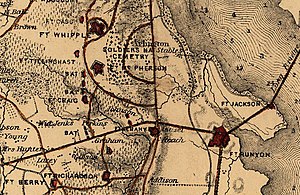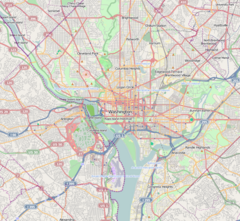38°51′28″N 77°04′41″W / 38.857827°N 77.07805638°W
| Fort Richardson | |
|---|---|
 1st Connecticut Heavy Artillery at Fort Richardson (1861) | |
| General information | |
| Status | Remnant open to public |
| Type | Civil war fort |
| Location | Arlington County, Virginia |
| Address | Army Navy Country Club, 1700 Army Navy Drive, Arlington, Virginia 22203 |
| Coordinates | 38°51′28″N 77°04′41″W / 38.857827°N 77.07805638°W |
| Elevation | 220 feet |
| Construction started | 1861 |
| Owner | Army Navy Country Club |
| Design and construction | |
| Architect(s) | Major Daniel Phineas Woodbury |
| Developer | Union Army |


Fort Richardson was a detached redoubt that the Union Army constructed in September 1861 as part of the Civil War defenses of Washington (see Washington, D.C., in the American Civil War).[1][2] The Army built the fort shortly after its rout at the First Battle of Bull Run (Manassas) in late July 1861.[3] The Army named the fort after General Israel B. Richardson, whose division had been deployed to defend the City of Washington against attack by way of the Columbia Turnpike.[2]
The structure, which was the highest fortification on the Arlington Line, occupied a commanding position on the crest of a ridge.[1][4][5][6][7] It had a perimeter of 316 yards and emplacements for 15 guns, including a 100-pound Parrott rifle that could sweep a sector from Fort Ellsworth[8] to Fort DeKalb (later named Fort Strong).[9] The fort housed bomb-proofs and two ammunition magazines, and was adjacent to a military encampment.[1][5][6][10]
A May 17, 1864, report from the Union Army's Inspector of Artillery (see Union Army artillery organization) noted the following:
Fort Richardson, Major Trumbull commanding.–Garrison, three companies First Connecticut Heavy Artillery–1 major, 12 commissioned officers, 1 ordnance-sergeant, 412 men. Armament, two 24-pounder field howitzers, six 24-pounder siege (smooth), one 100-pounder rifled Parrott, three 30-pounder rifled Parrotts, two 24-pounder Coehorn mortars, one 10-inch mortar. Magazines, two: dry and in good order. Ammunition, full supply and serviceable. Implements, complete and in good order. Drill in artillery, fair. Drill in infantry, fair. Discipline, fair. Garrison sufficient for the work.[11]
After the Civil War ended in 1865, the United States Army returned many of the properties that contained its fortifications in the Washington, D.C., area to the properties' rightful owners. In some instances, the Army compensated the owners for the use of the properties and for damages that had resulted from the Army's wartime activities. In addition, the Army sold at auction many of the fortifications' materials.[12]
The remnants of Fort Richardson are presently located on the grounds of the Army Navy Country Club in Arlington County, Virginia.[2][4] The fortification's earthen south wall and ditches are well-preserved.[1] A historic marker that the Arlington County government erected in 1965 stands along the Country Club's private access road (Memorial Drive) alongside the remnants of the fort.[2]
- ^ a b c d Cooling, pp. 85-90 Archived 2018-03-12 at the Wayback Machine: Filler Forts — Forts Berry and Richardson: Fort Richardson.
- ^ a b c d Swain, Craig, ed. (2011-01-15). ""Fort Richardson" marker". HMdb.org: The Historical Marker Database. Archived from the original on 2018-03-05. Retrieved 2018-03-05.
- ^ "The Arlington Line". History of Arlington County. Arlington, Virginia: Arlington Historical Society. Archived from the original on 2012-04-20. Retrieved 2018-03-05.
- ^ a b Barnard, John Gross (1871). "A Report on the Defenses of Washington: To the Chief of Engineers, U.S. Army". Professional Papers of the Corps of Engineers, U.S. Army (20). Washington, D.C.: United States Government Printing Office: 22. LCCN 12016144. OCLC 22045483. Archived from the original on 2018-03-12. Retrieved 2018-03-05 – via Google Books.
Fort Richardson occupies a very commanding position. It is small, but well built, well armed, and amply provided with bomb-proofs and magazines. The ravines in front will be seen by the rifle-trenches in construction. A rifled 100-pounder is being placed in this work, which will sweep a sector from Fort Ellsworth to Fort DeKalb
- ^ a b "Fort Richardson and Camp of 1st Connecticut Heavy Artillery". Washington, D.C.: Library of Congress. 1861–1865. Archived from the original (photograph) on 2018-03-06. Retrieved 2018-03-05.
- ^ (1) Suydam, Marty (2017). "The Last Encampment". Walks with Charley: Sniffing Arlington Ridge History & Mystery. Bloomington, Indiana: AuthorHouse. pp. 18–19, 21. ISBN 978-1546212713. OCLC 1013721275. Archived from the original on 2018-03-12. Retrieved 2018-03-05 – via Google Books.
(2) Steven (2011-06-11). "Fort Richardson, Army-Navy Country Club". Civil War Washington, D.C. Archived from the original on 2018-03-05. Retrieved 2018-03-05 – via Blogger. - ^ Cooling, pp. 47-52 Archived 2018-03-12 at the Wayback Machine: Fort Ellsworth
- ^ (1) Cooling, p. 115 Archived 2018-03-12 at the Wayback Machine: Protecting the Northern Flank of the Arlington Lines — Forts Strong and C.F. Smith: Fort Strong.
(2) Swain, Craig, ed. (2008-03-02). ""Fort Strong" marker". HMdb.org: The Historical Marker Data Base. Archived from the original on 2018-03-06. Retrieved 2018-03-06. - ^ (1) Swain, Craig (2016-09-16). "Fortification Friday: Applying what we know about fortification batteries". To The Sounds of Guns: Civil War Artillery, Battlefields and Historical Markers. Archived from the original on 2018-03-05. Retrieved 2018-03-05.
(2) Brady, Mathew B. (photographer) (1861). "Brady's incidents of the war. (Fort Richardson Va.) Camp 1st. Conn Artilery [sic], Col. R.O. Tyler". Library of Congress. LCCN 2011647355. Archived from the original (photograph) on 2018-03-05. Retrieved 2018-03-05. - ^ Howe, A.P. (1864-05-17). "Report on the inspection of the defenses of Washington, made by the order of the Secretary of War: Fort Richardson, Major Trumbull commanding". In Scott, Robert N. (ed.). The War of the Rebellion: A Compilation of the Official Records of the Union and Confederate Armies. Published under the direction of the Secretary of War (1880-1891). 1 (Military Operations). Vol. 36. Washington, DC: United States Government Printing Office. p. 888. LCCN 03003452. OCLC 224137463. Retrieved 2018-03-15 – via HathiTrust Digital Library. (See: Official Records of the War of the Rebellion)
- ^ "Disposition of the Fortifications". The Civil War Defenses of Washington: Historic Resource Study: Part II, Chapter I: Silenced Guns. National Park Service. Archived from the original on 2017-07-12. Retrieved 2018-04-06.
